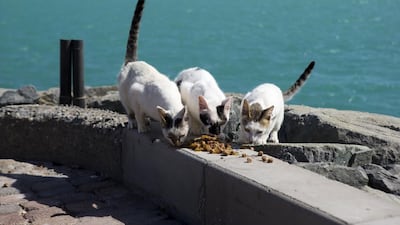This year, as in many years before, hundreds of pets will be dumped in the streets of Abu Dhabi, Dubai and the other emirates. They are left in the streets to live as “trash” by people who leave the country, can’t organise pet sitters, or whose circumstances have simply changed.
Pet dumping is an all-year phenomenon, but we see the misery of cats and dogs disposed of in our streets more in summer. It's this time of year when traffic accidents involving stray animals increase and a greater number of cats and dogs die from deprivation, disease or dehydration.
Many of us see stray cats and dogs in our daily life, although we may not look at them consciously. Most of us have them in our neighbourhoods or near our workplaces, where they usually come by night to search bins for food.
These creatures live a tough life because they have no shelter or regular food and water, and are exposed to the heat. Many of them are former pets or their offspring. Their former owners at some point in their lives wanted a cat or dog, perhaps as a birthday gift for a child. The pets were were later dumped, too often without being neutered, leaving them to fight for their own survival.
Many of us feel overwhelmed by the suffering of these disowned animals. Pets that are not neutered are left to stray in the streets as they go through an all-too-common cycle of pregnancy, birth and disease. The state in which some of these stray animals are picked up by animal rescuers is hard to describe: many animals suffer from skin and respiratory disease, eye infections, human abuse, traffic accidents and overall neglect, leaving many of them blind or disabled for life.
What’s even more distressing is that, despite all this, the pet trade has been flourishing in this country. Those of us who frequently take stray cats and dogs from the streets will probably never understand why the same animals we will later rescue from the streets continue to be sold at local animal markets. Many of them are exotic breeds, unsuitable for the country’s climate or for life on the streets. They are picked up by traders and supplied to those who are ready to pay, perpetuating the cycle of selling, buying and dumping.
Keeping alive this system is also a culture of apathy towards animals, as well as the perception that pets are toys that can be bought for entertainment, and abandoned when they are not wanted.
There are many ways to mitigate and even prevent the suffering of animals. A number of volunteer organisations, as well as Abu Dhabi Municipality, engage in trap-neuter-release (TNR) programmes, in which cats and dogs are caught, neutered and released back with a clipped ear as a sign of their TNR status.
While this does not protect these animals from injury or disease, it does support a long-term strategy of managing the number of stray animals effectively. Cities such as Istanbul have made major progress in this way, while many ordinary citizens devote their time to caring for stray animals.
Expanding TNR initiatives across the UAE could also save considerable funds in the future. This is why many volunteer organisations prefer to spend on rescue care, rather than prevention and population control. But there are other options. Linking pets to their pet-owners’ passports combined with obligatory microchipping of animals brought into or bought within the UAE could help track owners’ actions. Pet dumping is illegal but enforcing this law is difficult if no register exists for pets.
Some European countries have gained experience in regulating the pet trade by enforcing strict rules on pet breeding or banning pet sales altogether. Some communities in Germany have been discussing obligatory neutering programmes for all cats with outside access.
This is a good time for us to think about what kind of society we want to be – one that affords many luxuries and has enough to share but walks away from the misery of stray animals or one that helps and protects animals.
Laura El Katiri is a consultant in Abu Dhabi specialising in economic, energy and environmental policy
On Twitter: @lauraelkatiri

